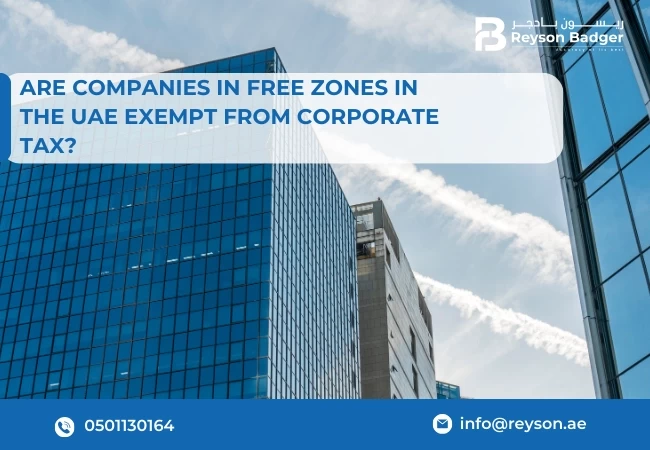Are companies in Free Zones in the UAE exempt from corporate tax?
Written By Akshaya Ashok, Reviewed By Nouphal P C
Published on 11/01/2025

The United Arab Emirates (UAE) is considered one of the leading global business hubs. Investors and entrepreneurs from all over the world are drawn to it. To help the economy fluctuate, the UAE has set up a corporate tax system. This system tries to balance making money for the government while still inviting businesses to invest. However, understanding free zone corporate tax in the UAE can be tough. This is especially true for companies in Free Zones. It's important for these companies to know about tax exemptions. This knowledge helps them manage their taxes and follow the rules.
In this blog, we’ll explain corporate tax exemptions for Free Zone companies in UAE. We want to help businesses make smart choices and stay ahead.
What are Free Zones in UAE?
Free zones in UAE are designated areas that provide a range of economic incentives to attract foreign investment and promote business activities. These zones are governed by their own regulatory frameworks, allowing businesses to operate under distinct rules that differ from those applicable in the mainland UAE.
Types of Free Zones in UAE
The UAE features over 45 free zones, each designed to cater to specific industries and business requirements. They can be broadly categorized into:
- Seaport Free Zones: Located near major ports, these zones facilitate trade and logistics.
- Airport Free Zones: Positioned around airports, they cater to businesses involved in air freight and logistics.
- Mainland Free Zones: These zones allow for a mix of commercial activities and often cater to various sectors, including manufacturing and services.
Some notable examples include:
Advantages of establishing a business in a Free Zone
Businesses operating within free zones enjoy several advantages, including:
- 100% Foreign Ownership: Free zone companies in UAE can be fully owned by foreign investors, unlike mainland companies that usually require a local partner.
- Tax Exemptions: Companies benefit from exemptions on corporate taxes for up to 50 years, with no personal income taxes imposed.
- Customs Benefits: There are no import or export duties on goods traded within the free zone, facilitating easier international trade.
- Repatriation of Profits: Businesses can repatriate 100% of their profits without restrictions, enhancing financial flexibility.
- Streamlined Setup Processes: The establishment process is generally quicker and less bureaucratic compared to mainland setups, with dedicated support from Free Zone Authorities.
Are Free Zone Companies Exempt from Corporate Tax?
Free zone companies in UAE can benefit from significant tax exemptions under the new corporate tax regime established by Federal Decree-Law No. 47 of 2022, effective from June 1, 2023. Specifically, businesses classified as Qualifying Free Zone Persons (QFZPs) are eligible for a 0% corporate tax rate on qualifying income. However, if they do not meet the qualifying criteria, they will be subject to a 9% corporate tax rate on taxable income exceeding AED 375,000.
Eligibility for Tax Exemptions
To qualify for the 0% corporate tax rate, free zone companies must meet several specific conditions:
- Adequate Presence in UAE: Businesses need to establish a physical presence in UAE, which includes having office space and employees working within the free zone.
- Qualifying Income: Revenue must fall under categories defined by Cabinet Decision No. 55 of 2023, which includes transactions between free zone entities and international income.
- Compliance with Transfer Pricing Rules: Adherence to OECD guidelines for transfer pricing is necessary to ensure that cross-border transactions are conducted at arm’s length.
- Economic Substance Regulations (ESR): Companies must demonstrate substantial economic activity within the free zone to affirm their contribution to the UAE economy.
Types of Taxes that Free Zone Companies are Exempt From
Free zone companies enjoy exemptions from several types of taxes:
- Corporate Tax: QFZPs can benefit from a 0% corporate tax rate on qualifying income. Non-qualifying income will incur a 9% tax.
- Withholding Tax: Generally, free zone companies are exempt from withholding taxes on payments made to them, enhancing their financial flexibility.
- Import and Export Duties: Free zones typically allow for duty-free import and export of goods, further reducing operational costs.
Advantages of Tax-Free Benefits for Free Zone Companies
Free zone companies in UAE enjoy a variety of tax exemptions that significantly enhance their operational advantages. Here are the key benefits associated with these tax exemptions:
One of the most compelling benefits for free zone companies is the reduced tax liability. Qualifying Free Zone Persons (QFZPs) can benefit from a 0% corporate tax rate on qualifying income, which allows businesses to retain more of their earnings compared to mainland counterparts that face a 9% corporate tax on taxable income exceeding AED 375,000. This substantial reduction in tax burden enables companies to reinvest profits into growth and development, enhancing their financial stability and competitiveness in the market.
- Increased Competitiveness
The favorable tax regime in free zones contributes to increased competitiveness for businesses operating within these areas. With lower operational costs due to tax exemptions, free zone companies can offer more competitive pricing and better services. This advantage is particularly beneficial in sectors such as manufacturing, logistics, and technology, where cost efficiency is critical for success. Additionally, the ability to fully repatriate profits and capital without restrictions further strengthens their competitive position in global markets.
- Simplified Tax Compliance
Free zone companies benefit from simplified tax compliance processes compared to those in the mainland. The regulatory framework in free zones is designed to facilitate easier business operations, with streamlined procedures for setting up and maintaining compliance. This includes clear guidelines on qualifying activities and income, which helps businesses navigate the complexities of the new corporate tax law effectively. Moreover, the absence of personal income tax for employees working in free zones makes these locations attractive for talent acquisition, further simplifying workforce management and compliance.
Limitations and Restrictions on Tax Exemptions
While free zone companies in UAE enjoy significant tax exemptions, several limitations and restrictions apply to ensure compliance with the free zone corporate tax regime. Below are the key aspects regarding these limitations:
Limitations on the Types of Business Activities Eligible for Tax Exemptions
Not all business activities conducted within free zones qualify for the 0% corporate tax rate. The following activities are typically excluded:
- Transactions with Mainland UAE Entities: Income derived from selling goods or providing services to businesses located in the mainland UAE does not qualify for the 0% tax rate and is subject to a 9% corporate tax.
- Banking and Insurance Services: Financial institutions and insurance providers often fall outside the scope of qualifying activities, making their income taxable at the standard rate.
- Immovable Property Transactions: Income from residential property transactions is generally excluded, except for commercial property transactions between free zone entities.
- Professional Services to Non-Free Zone Persons: Services provided by free zone entities to individuals or businesses outside the free zone, particularly in the mainland UAE, do not qualify for tax exemptions.
- Activities Related to Natural Persons: Income from transactions with natural persons is typically excluded unless it pertains to specific qualifying activities like shipping operations.
Restrictions on the Transfer of Goods and Services Between Free Zones and the Mainland UAE
Free zone companies face restrictions when transferring goods and services between free zones and the mainland UAE. Specifically:
- Customs Duties: Goods moving from a free zone to the mainland may incur customs duties unless specific conditions are met. This can complicate logistics and supply chain management for businesses operating in both areas.
- Qualifying Activities Requirement: Only income derived from qualifying activities that meet specific criteria can be exempt from free zone corporate tax. If a free zone company engages in non-qualifying activities related to mainland transactions, it risks losing its tax-exempt status.
Requirements for Maintaining Tax-Exempt Status
To retain their tax-exempt status, free zone companies must adhere to several requirements:
- Adequate Substance in UAE: Companies must maintain a physical presence, including office space and employees within the free zone, demonstrating substantial economic activity.
- Compliance with Economic Substance Regulations (ESR): Businesses must comply with ESR requirements, showcasing their contributions to the UAE economy through genuine operational activities.
- De Minimis Rule Compliance: Free zone businesses can generate a limited amount of non-qualifying income while still benefiting from a 0% tax rate. Specifically, non-qualifying income must not exceed either 5% of total revenue or AED 5 million, whichever is lower. Exceeding this threshold may result in losing QFZP status and being subject to corporate tax on all income at a 9% rate.
Conclusion
Companies in UAE Free Zones enjoy various tax advantages, such as exemptions from corporate tax, withholding tax, and value-added tax. However, understanding the specific rules and limitations for each Free Zone is crucial to fully leveraging these benefits. With the right guidance, businesses can maximize their tax savings and operate efficiently.
Starting a business in a Free Zone is a strategic decision that combines tax benefits, simplified regulations, and excellent infrastructure. This makes Free Zones an attractive option for startups and established companies alike. Partnering with experts like Reyson Badger ensures you navigate these opportunities effectively, enabling your business to thrive in this competitive environment.

Written By
Akshaya Ashok
Akshaya Ashok is a content writer specializing in creating content focused on accounting and auditing. With over two years of experience, she has developed expertise in crafting professional content for the financial sector.

